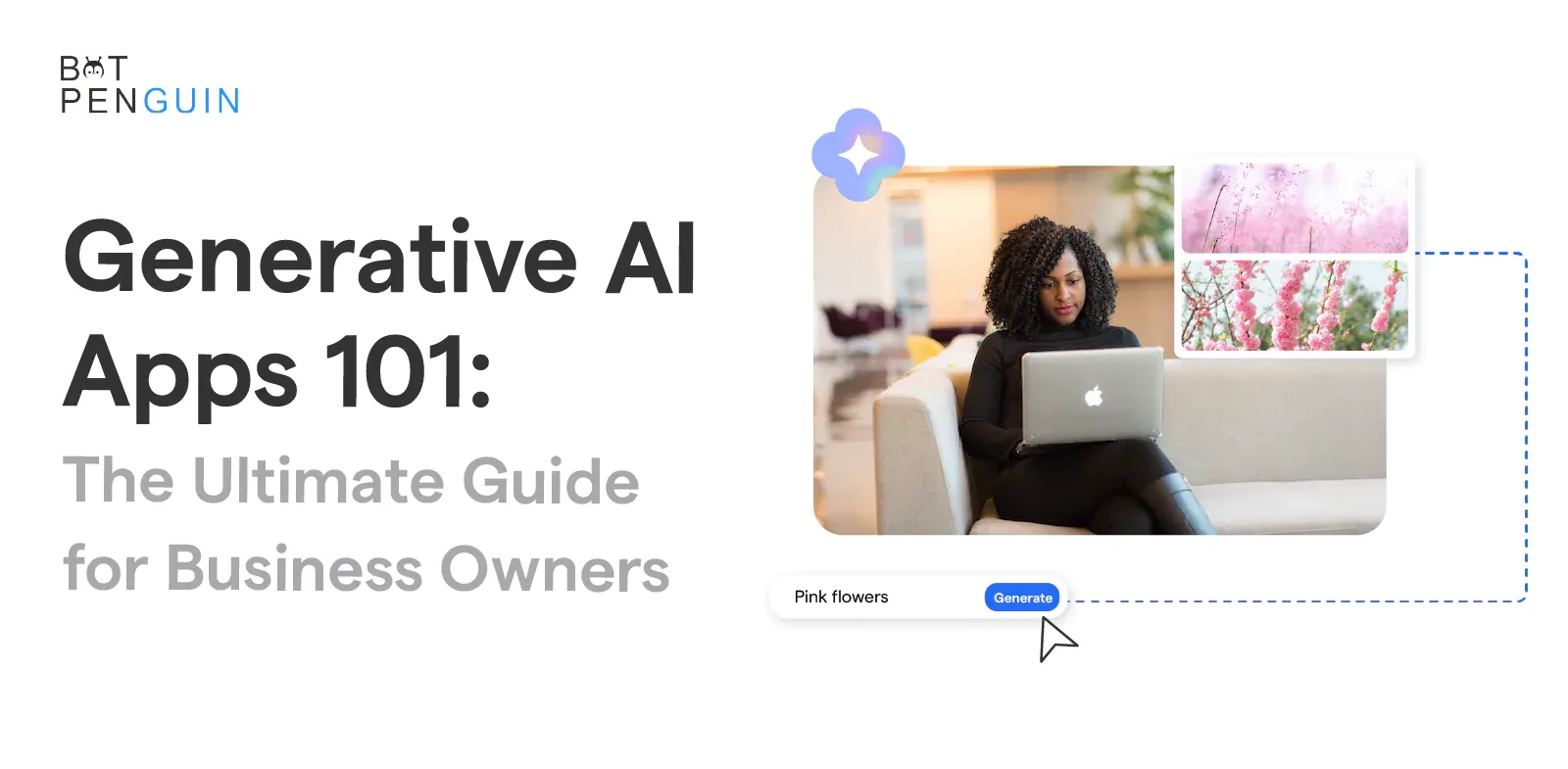The world is using generative AI to generate art, compose music, code, and even write poetry, and it will only get better with time.
To some, the thought of software creating human-like content might seem promising; to others, it is a step toward AI dystopia. Regardless, generative AI is here to stay and change how we interact with technology.
I think it is as great an invention as primitive humans creating wheels; it changed the world, and so will AI.
The common public has swarmed the ChatGPT like a mall on black Friday sale. OpenAI had to scale up to 7500 nodes to meet the growing usage requirements.
But what about businesses? How can they use generative AI to their advantage?
Well, generative AI apps can design products, personalize customer experiences, and automate repetitive tasks. They are not just a passing trend but the future of business.
In this ultimate guide, we will unravel the potential of generative AI and explore how it can revolutionize your business strategies. Ready to dive in? Let's begin.
Understanding Generative AI
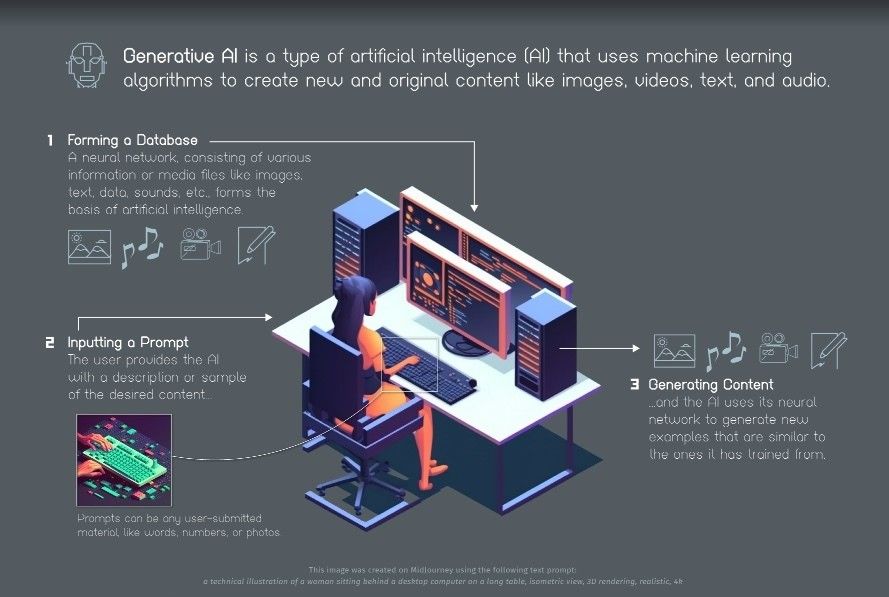
Generative AI uses machine learning models to analyze large amounts of existing content, such as art, music, or text. By finding patterns and relationships within this data, the models can create new, original forms of content inspired by what they learn.
Generative AI is also known as generative adversarial networks (GANs). It is a branch of artificial intelligence that focuses on creating new and original content. It goes beyond traditional AI, primarily focusing on predictive or reactive tasks.
Think of it like a writer who reads several articles on a given topic and then uses that knowledge to create original & unique content.
Generative AI aims to replicate human intelligence to generate creative and imaginative outputs. It is based on two essential parts: the generator, which produces new content, and the discriminator, which evaluates and judges the generated content based on its authenticity.
Let's dive deeper into generative AI to understand how it works and its different applications.
How Does Generative AI Work?
Generative AI works like this: It learns from a lot of examples and figures out the rules behind them. Imagine teaching a computer by showing it lots of pictures or text.
It then practices and gets better at creating new stuff similar to what it's learned. So, it's like a learning machine that keeps getting smarter at making things that seem human-made.
Different Types of Generative AI Models
Various types of generative AI models are commonly used in different applications. Some prominent ones include:
- Variational Autoencoders (VAE): These models learn how to encode and decode data by assuming a latent representation for the input. VAEs are commonly used for image and video generation tasks.
- Recurrent Neural Networks (RNN): RNNs are ideal for generating sequential data, such as text or music. They have a feedback loop that allows them to consider previous input when generating subsequent outputs.
- Transformers: Transformers excel at capturing long-range dependencies in data and are commonly used for natural language processing tasks. They have revolutionized machine translation, text generation, and dialogue systems.
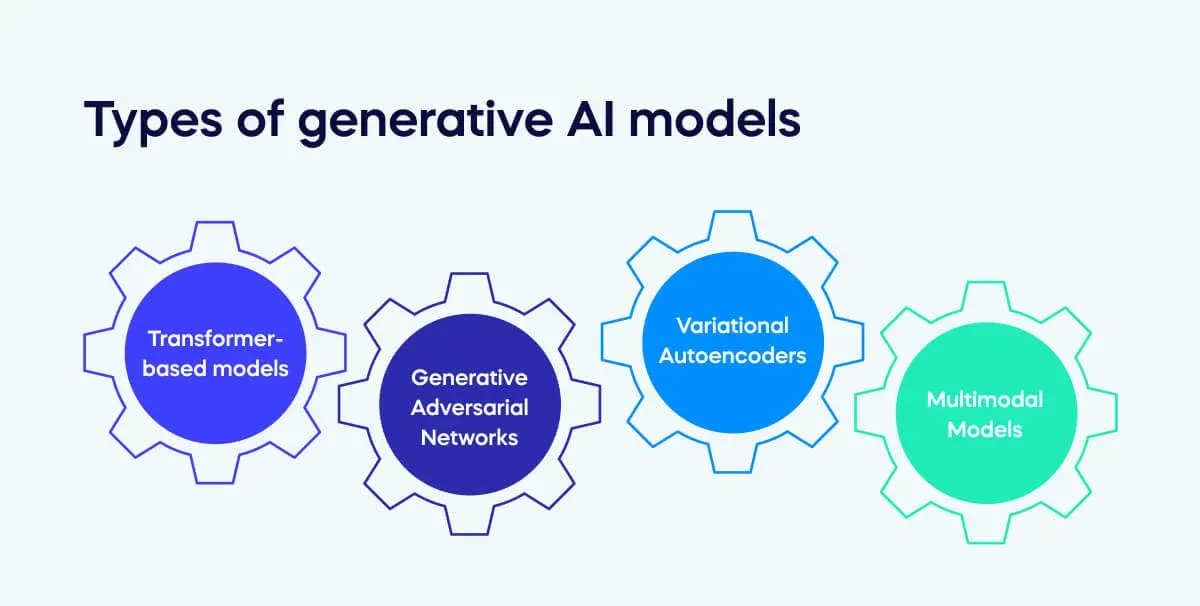
Common Applications of Generative AI Across Industries
Generative AI has found applications across various industries, revolutionizing how businesses operate. Here are some prominent examples:
- Creative Arts: Generative AI models can create visually stunning artwork, compose unique pieces of music, and even generate realistic human faces.
- Content Generation: Businesses can leverage generative AI to automate content creation and generate personalized product descriptions, marketing copy, and social media content.
- Gaming: Generative AI creates virtual game worlds, generates lifelike characters, and develops realistic game narratives.
- Virtual Reality (VR): Generative AI can enhance VR experiences by generating immersive environments, realistic textures, and dynamic scenarios.
In conclusion, generative AI is a powerful technology that has the potential to revolutionize various industries. By understanding how it works and exploring its different applications, businesses can unlock new opportunities for creativity, efficiency, and innovation.
Top Use Cases of Generative AI Apps for Businesses
Generative AI apps can automate various business operations. These applications have become indispensable business tools because they can create content, design images & graphics, aid in product development, enhance personalization and marketing efforts, and improve customer service & support.
So, I will show you the top use cases of generative AI apps and how they can benefit businesses.
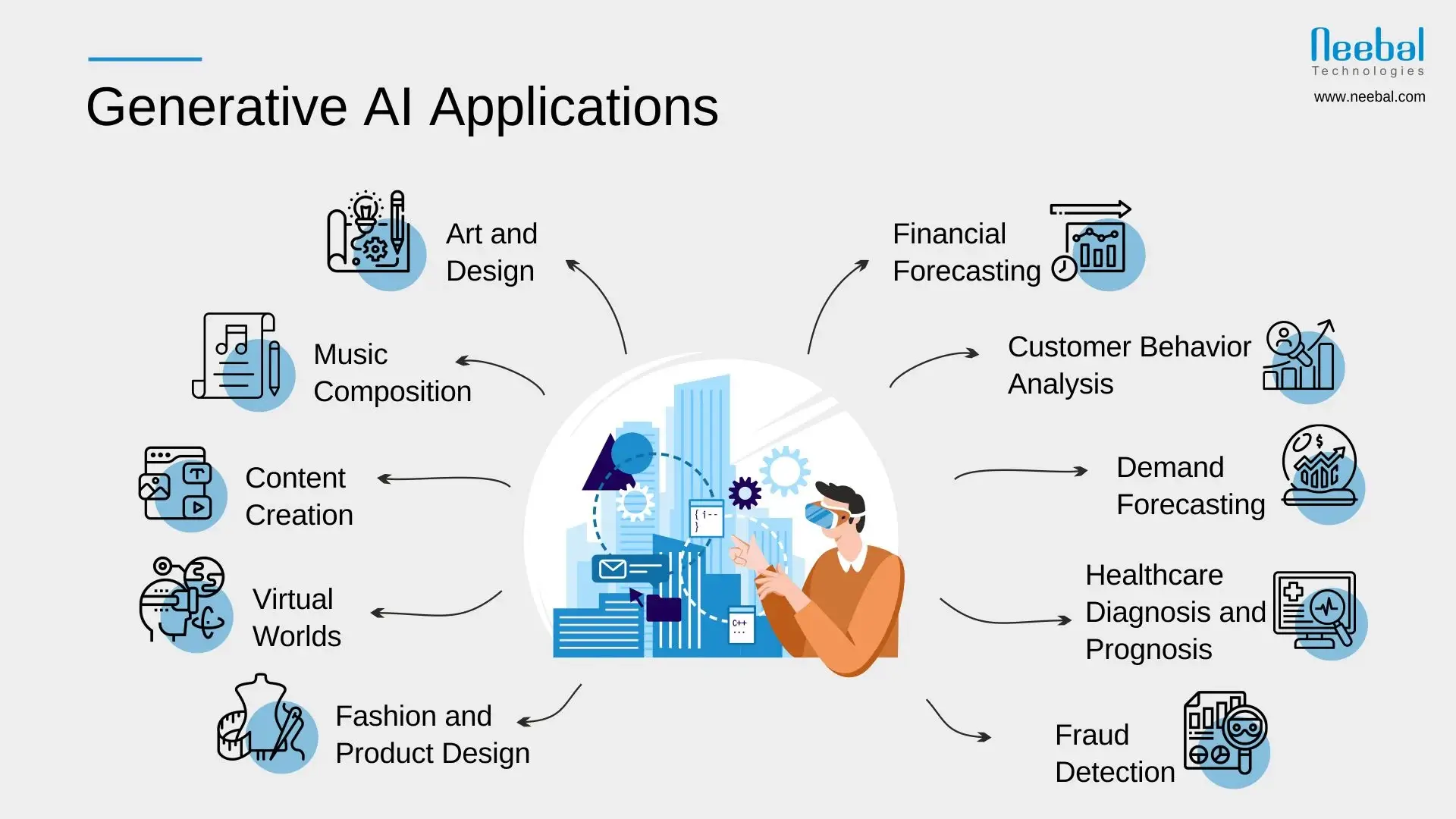
Content Creation
Generative AI apps have the power to generate different creative text formats, including poems, code snippets, and scripts, which can help businesses that require unique and engaging content for their websites, blogs, or social media platforms.
These apps can also create product descriptions, marketing copy, and social media content, saving businesses significant time and effort.
Design and Development
Designers and developers can have a field day using Generative AI apps. They can generate design ideas and prototypes, providing a starting point for new projects.
Moreover, they can automate repetitive tasks in design workflows, letting them focus on more creative elements of their work. This streamlines the design and development process and boosts productivity.
Suggested Reading:
Personalization and Marketing
Personalized customer experiences are crucial for businesses to attract and retain customers. Generative AI apps can play a vital role in achieving this goal. By analyzing customer data, these apps can personalize customer experiences by tailoring product recommendations, advertisements, and communication-based on individual preferences and behaviors.
Additionally, they can help businesses create targeted marketing campaigns that resonate with specific customer segments, leading to increased engagement and conversions.
Customer Service and Support
Delivering efficient customer service and support is essential for businesses to maintain strong customer relationships. Generative AI apps can assist chatbots with customer service.
In most cases, it involves integrating the generative AI model into the chatbot platform and training it on website data to talk to customers in a human-like tone.
For example, BotPenguin is a chatbot platform that provides AI chatbots for websites, Whatsapp, Facebook, Telegram, MS Teams, etc. It integrates with any ChatGPT model and provides generative AI capabilities to the chatbot.
The chatbot can be training URLs, custom data sets, FAQs, & previous interactions, allowing it to master your business knowledge bases in minutes and answer queries like a seasoned agent.
Plus, you can auto-translate text, personalize conversation based on context, and select the tone. It can fit any business use case, including healthcare, education, eCommerce, insurance, SAAS, & more.
These chatbots can handle basic customer queries, respond instantly to frequently asked questions, and even assist in troubleshooting common issues.
By automating these processes, businesses can ensure round-the-clock support and free up customer service personnel to focus on more complex inquiries, improving customer satisfaction.
- Marketing Automation
- WhatsApp Automation
- Customer Support
- Lead Generation
- Facebook Automation
- Appointment Booking
How to Choose the Right Generative AI App for Your Business?
Several factors must be considered when choosing a generative AI app for your business. By following a systematic approach, you can ensure that you select the proper app that aligns with your business needs and goals.
In this section, I will outline a step-by-step process to help you make an informed decision.
Identify Your Business Needs and Goals
Before learning about generative AI apps, it is essential to define your business needs and goals clearly. Determine the areas where you require assistance from generative AI, such as content creation, design, personalization, or customer service. By identifying your priorities, you can narrow your options and focus on apps that cater to your requirements.
Consider the Features and Functionalities of Different Generative AI Apps
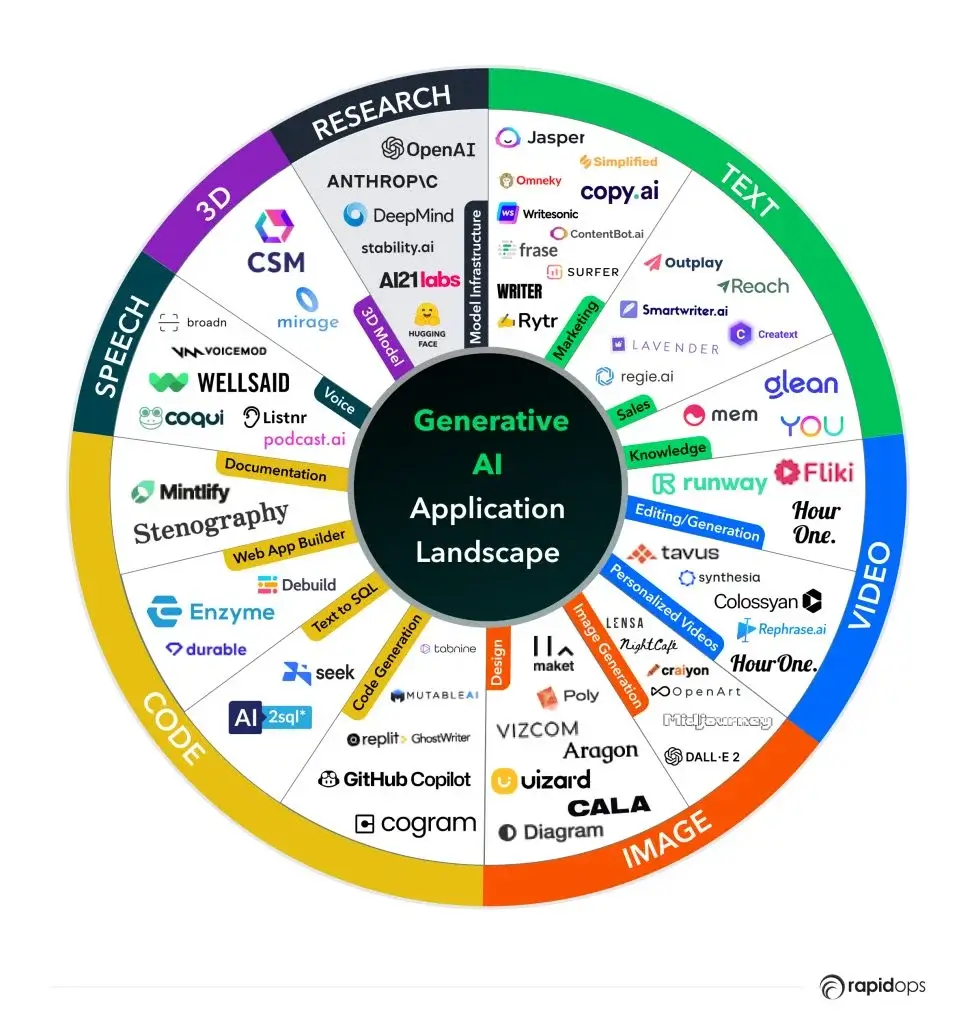
Once you clearly understand your needs, it's time to explore the features and functionalities offered by various generative AI apps. Look for apps that provide the specific capabilities you require, such as text generation, design prototyping, or personalized marketing.
Consider the app's flexibility, customization options, and compatibility with your existing systems. This will help determine if the app aligns with your business processes and workflows.
Evaluate the Pricing and Ease of Use
Pricing and ease of use are crucial considerations when selecting a generative AI app. Evaluate the cost structure of different apps, including any subscription fees or additional charges for add-on features. Assess whether the pricing model fits within your budget and offers a reasonable return on investment.
Additionally, consider the app's user interface and intuitiveness. Opt for a user-friendly app that offers a smooth onboarding experience, ensuring you and your team can efficiently utilize its capabilities.
Look for User Reviews and Case Studies
To gain insights into the real-world performance of generative AI apps, it's beneficial to explore user reviews and case studies. Look for feedback from businesses like yours and assess their experiences with different apps.
Pay attention to the app's reliability, customer support, and overall user satisfaction. Case studies can provide valuable information about the app's effectiveness in achieving specific business goals. This research will help you make an informed decision based on others' experiences.
Suggested Reading:
Getting Started with Generative AI Apps
Generative AI apps have the potential to revolutionize how businesses operate and innovate. If you're eager to harness their power, it's essential to approach their implementation strategically.
So, let’s discuss the steps to get started with generative AI apps and maximize their capabilities.
Choose a Reputable Generative AI App Provider
To ensure a successful start, choosing a reputable generative AI app provider is crucial. Look for providers with a proven track record and positive customer reviews. Consider factors like the app's reliability, security, and customer support. Selecting a trusted provider gives you confidence in the app's performance and support.
Explore the App's Features and Functionalities
Once you've selected an app provider, explore the features and functionalities offered by their generative AI app and familiarize yourself with the app's user interface and available tools.
Understand the app's capabilities, such as content generation, design assistance, or personalized customer experiences. This exploration will enable you to determine how the app can best support your business needs.
Start With Small Projects and Gradually Scale Up
To ease into using generative AI apps, start with small projects and gradually scale up. Experiment with specific use cases where the app can provide immediate value. This may include generating content for a blog post or designing a mockup for a new product.
As you gain familiarity and confidence, expand your usage to tackle more complex projects that can significantly impact your business.
Monitor Results and Fine-tune Your Approach
As you incorporate generative AI apps into your workflow, regularly monitor the results and fine-tune your approach. Analyze the app's output and assess its effectiveness in meeting your goals.
Adjust the app's settings or parameters as necessary to improve the quality or relevance of the output. This iterative process will help you optimize your app usage and achieve the desired outcomes.
The Future of Generative AI
Generative AI has already made significant strides in transforming various industries, and its potential impact on businesses is undeniable.
This section covers the future of generative AI, including its impact, emerging trends, technological advancements, and ethical considerations.
Potential Impact of Generative AI on Businesses
Generative AI has the potential to revolutionize businesses by automating and enhancing various processes. It can assist in content creation, design, personalization, and decision-making. Businesses can leverage generative AI to streamline workflows, improve efficiency, and unlock new opportunities for innovation.
With the ability to generate creative and personalized content, generative AI has the potential to enhance customer experiences and engagement. Furthermore, it can empower businesses to make data-driven decisions and gain valuable insights from vast information.
Emerging Trends and Advancements in Generative AI Technology
The field of generative AI is rapidly evolving, and there are several emerging trends and advancements to watch out for. One such trend is the use of generative adversarial networks (GANs), which enable the creation of highly realistic and complex outputs.
Another trend is the integration of generative AI with other technologies, such as augmented reality (AR) and virtual reality (VR), to create immersive and interactive experiences.
Additionally, natural language processing (NLP) advancements are making generative AI even more capable of understanding and generating human-like text.
Ethical Considerations and Responsible Use of Generative AI
Like any technology, generative AI is also a double-edged sword with its immense potential for misuse. For example, we have seen several cases where AI generates fake news or deepfake content.
Another famous example is Google’s Gemini, which generated inaccurate historical images for which Google eventually had to apologize to the public. This was the result of human bias seeping into the AI program.
So, you must establish guidelines and ethical frameworks to ensure the responsible use of generative AI and prevent potential risks.
Transparency and accountability in developing and deploying generative AI algorithms are critical to avoiding biased or discriminatory outputs. By adopting ethical practices, businesses can harness the immense power of generative AI while maintaining trust and integrity.
Conclusion
In conclusion, generative AI apps have the potential to revolutionize how businesses operate and innovate. By harnessing the power of these apps, business owners can automate processes, enhance creativity, and deliver personalized customer experiences.
Through careful implementation, starting with small projects and gradually scaling up, businesses can unlock the full potential of generative AI apps. However, it's crucial to consider ethical considerations and responsible use to ensure the integrity and trustworthiness of the generated content.
With a strategic approach and continuous monitoring, businesses can leverage generative AI apps to drive efficiency, foster innovation, and stay ahead in today's rapidly evolving digital landscape.
Suggested Reading:
Frequently Asked Questions (FAQs)
How is generative AI being used in business?
Generative AI is used in business for tasks like content generation, product design, and personalized recommendations. It's employed in creating realistic images, generating text for marketing campaigns, and automating repetitive tasks, ultimately enhancing productivity and innovation across various industries.
How much is generative AI worth for business?
The value of generative AI for business varies depending on factors like industry, use case, and implementation. However, businesses can expect benefits such as cost savings from automation, improved product customization, enhanced creativity in content generation, and better customer engagement, collectively contributing to significant value.
How can generative AI help small businesses?
Generative AI can help small businesses by automating tasks like content creation, graphic design, and customer support, reducing operational costs and saving time. It enables small businesses to compete with larger counterparts by offering personalized products/services, enhancing customer experiences, and staying innovative in their marketing strategies.
How is generative AI used in marketing?
Generative AI is used in marketing for tasks like content creation, ad generation, and personalization. It helps marketers create engaging visuals, generate targeted ad copies, and customize campaigns for specific audience segments. Additionally, it aids in analyzing data to optimize marketing strategies and improve ROI.
How can business owners integrate generative AI apps into their operations?
Business owners can integrate generative AI apps into various aspects of their operations, including product design, content creation, customer service automation, and personalized marketing campaigns. By leveraging these apps, businesses can streamline processes, improve efficiency, and drive innovation.
What skills or resources are required for business owners to implement generative AI apps?
Implementing generative AI apps may require data analysis, programming, and AI model customization skills. Business owners may also need access to relevant datasets, AI development tools, and expertise in deploying and managing AI solutions within their organization.
What are the potential challenges or limitations of using generative AI apps in business?
Challenges may include the need for high-quality training data, the risk of generating low-quality or misleading content, the requirement for computational resources, and the potential for AI-generated content to lack human creativity or intuition.
How can business owners measure the effectiveness and ROI of generative AI app implementations?
Business owners can measure effectiveness by tracking metrics such as productivity gains, cost savings, customer engagement, and revenue growth resulting from the use of generative AI apps. ROI calculations may involve comparing the benefits achieved with the costs incurred in implementing and maintaining these apps.
